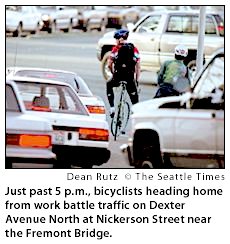| Friday, March 31, 2000
More and more commuters choose life in the bike lane by Andrew Garber
|
 |
Five o'clock on Dexter Avenue North. The commute is on, and cars are backed up as usual. Time for drivers to drum their fingers, waiting.
Mary Jeffers-Schroder sails by with a stream of other cyclists. The moment is a high point in her day.
"They're all backed up and I'm going past them. It's great," she says, pausing in the commute from her federal job downtown at Sixth Avenue and Blanchard Street to her home in Crown Hill north of Ballard.
As cars slow down from traffic congestion, biking to work has become more competitive with driving because the trip time is often about the same. And by all accounts, there are more people than ever commuting on two wheels like Jeffers-Schroder.
It appears that more people are putting their bikes on King County Metro buses and vans. Cyclists often wait in line to get their bikes on buses traveling across the Highway 520 bridge.
Even some of the bike trails are becoming congested.
"We've found people start riding outside of the peak times (on bike trails) just like you do with the car," said Peter Lagerwey, the bicycle and pedestrian coordinator for the city of Seattle.
The city is waiting for the 2000 census to figure out whether a greater proportion of residents is commuting by bike, or if the growth is simply a reflection of Seattle's burgeoning population.
In any case, it's clear that traffic congestion is helping spur people to abandon their cars in favor of bikes.
"On a lot of streets now, average speeds are anywhere from 10 to 15 miles per hour, and the average bike speed, when you are commuting, is usually 12 to 14 miles per hour," Lagerwey said. "So it becomes very competitive."
While the census data is still out, there are other indications that more people are commuting by bike.
The county doesn't count how many bikes are put on buses, but it does know how many are accidentally left behind. Last year, 472 bikes were left on buses, up 18 percent since 1997.
At the request of customers, King County has outfitted 226 of its vans, used for van-pooling, with bike racks. That represents 37 percent of the van fleet, up from 13 percent in 1995.
A 1999 survey of 6,000 people by the Puget Sound Regional Council found that 4.3 percent of those surveyed commute to school or work by bike. By comparison, 1.3 percent commute by motorcycle.
Lagerwey said he can tell there are more people commuting just by looking at the trails.
"If anything, we have a problem with success. There is no question the facilities get used and fill up," he said.'
Jeffers-Schroder, who has been making a 16-mile round-trip commute by bike for the past five years, said she's noticed the change.
Five years ago, it was rare to see people in her Crown Hill neighborhood coming home from work on bikes. "Now I see people all the time," she said.
There are drawbacks, such as rain and having to shower and change clothes at work. But the benefits outweigh all that, cyclists say.
Jeffers-Schroder, who is 51 and works for the U.S. Department of Health and Human Services, started commuting by bike because of traffic congestion and the realization that the time spent pedaling was comparable to driving.
There are plenty of other reasons to switch as well, she said, including saving money on gas and parking.
"I'm saving at least $100 a month, if not more," Jeffers-Schroder said.
Bike commuters also say exercise is a strong incentive. It's a way to work out and commute at the same time.
Many cyclists say they save time and money because they gave up their memberships at health clubs and gained the time they had spent working out.
A person who weighs 180 pounds and pedals 14 miles in an hour will burn 540 calories. The average bike commuter travels 1,992 miles in a year, according to the city's Transportation Department.
"I'm unquestionably in better shape," said Ted Inkley, an assistant city attorney in Seattle who has a 16-mile round-trip commute by bike from his home in the Phinney Ridge area.
Inkley, 47, said he used to take the bus before switching to a bike. Driving a car holds little appeal.
"It's incredibly stress-producing,"
he said. "I don't like driving in traffic. It's not even remotely comparable
to what it was 10 years ago. Life is tough enough without subjecting yourself
to that on
your way to work."